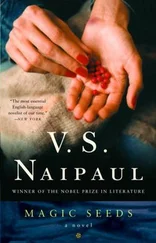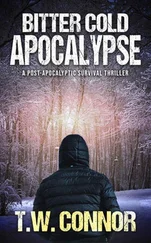A pair of the heaviest steel doors Will had ever seen sectioned off each corridor. Lush, deep-pile chenille carpeting covered every inch of the corridors themselves, floor to ceiling, including the widely spaced doorways lining each wall.
The carpeting, he knew, was there to absorb sound. He knew it because of the placards, posted everywhere:
SILENCE, PLEASE!
CONVERSATION IS STRICTLY FORBIDDEN AT ALL TIMES!
ABSOLUTELY NO LANGUAGE PERMITTED ON THE PREMISES!
But the insulation wasn't perfect. If Will strained enough, he could discern the wailing of hungry babies.
He knew that if he waited, sooner or later the wet nurses would arrive, perhaps under armed escort, to enter the vaults. But he already knew what the vaults held.
Newborns, not more than a few months old.
War orphans.
3 September 1941
Walworth, London, England
The vines were thick and sturdy, their tomatoes tiny pale-green bulbs that would swell and redden into autumn. Marsh slowly worked down the row, inspecting every leaf for signs of blight or infestation. He trimmed a shoot edged with brown. The wet, loamy smell of the opened vine mixed with the aroma of Liv's bread baking in the kitchen.
Homemade bread was the only kind to be had in these first months after the war. Nobody complained. People were too busy celebrating. The war was over, and Britain had survived. No more air raids, no more gas masks. Life had mostly returned to normal.
But the rationing had become stricter. Bread was just one of many items that had been added to the list of rationed goods. Goods that would be sent to the Continent in a desperate attempt to feed the millions left starving by the unnatural winter. He knew, from listening to the wireless, that Stalin had invited Churchill and Roosevelt to Paris to discuss the situation.
He also knew that the Japanese had gobbled up the Kamchatka Peninsula and Sakhalin Island while the Soviets were busy dealing with scattered pockets of Nazi resistance in Europe. He wondered if that would be on the table for discussion in Paris. Churchill would have to step carefully around the issue, because—
No. Marsh grabbed the reins of his runaway mind, forced his galloping thoughts to a halt. It's not my problem any longer. I don't do that work anymore.
I'm done.
He would need to find a new situation soon. Before long, they'd have another mouth to feed. But he'd postponed the search for employment as long as possible. The summer had been for him and Liv. Marsh was back with the love of his life, and together they were building a new family.
Footsteps crunched on the gravel behind him. A shadow covered the sun, a miniature eclipse where he kneeled among the plants. For an instant, he tensed, remembering a ghostly figure in the shadows of St. James' Park. But he shook it off.
No. It's not my problem any longer.
“I'll be right in, Liv.” Marsh trimmed another shoot, inhaling deeply. He smiled. “Can't wait for that bread.”
“Patience never was one of your virtues, Pip.”
Marsh started, turned. Will stood just outside the plantings, silhouetted by the sun.
“Will! This is a surprise,” Marsh said as he climbed to his feet, slapping the soil from his dungarees. “When did you get here? I didn't know you were back in town.”
“It requires a lot of pruning,” said Will, pointing at the vines.
Marsh said, “Not so much as I feared. They're—” He stopped himself, alarmed by the quaver in Will's voice, his tremorous hand. His old friend looked rumpled, gray. Oh, no. “What requires pruning, Will?”
“Children. Many, many children.” Will's breath stank of juniper berries. “Lean harvest, you know.” He giggled.
We'd heard Will was improving. But he's hardly coherent. He's fallen, hard. Marsh took him gently by the arm. “Let's go inside. I think we should call Aubrey.”
This one is my problem. My fault.
He pulled Will's arm over his shoulder and led him toward the house. Liv must have glimpsed them from the kitchen, because she stepped outside as they approached. “Will! It's so good to see you! It's been ages.”
“Olivia.” Will staggered against Marsh before righting himself. Liv made brief eye contact with Marsh, and he saw the frown of concern tugging at her freckles.
Will doffed his bowler and performed an unsteady bow. “You are a vision as always, my dear,” he said, looking her up and down. His eyes widened when he saw the slight bulge of her stomach.
He turned. “Pip?” His breath stung Marsh's eyes.
“We're starting another family, Will. Starting over.”
A dark reflection clouded Will's eyes, as though he were looking at something vast and dangerous. Marsh recognized the shadow, a legacy of Milkweed. The unhealthy pallor in Will's face deepened. Marsh saw he carried a wire-bound manuscript: a copy of the master lexicon.
“Unborn child,” Will whispered. He trailed off, his lips moving soundlessly. He turned to look at Liv again, mumbling to himself. “Soul.”
“We've been discussing names,” said Liv with forced joviality. “We thought that—”
“You have to get rid of it,” he blurted. “Get rid of that baby. I know a doctor... .”
Liv's mouth fell open. Her hands went to her stomach, and she took a step back, the hurt plain on her face.
Marsh grabbed Will's elbow, spun him around. “What did you just say to my wife?”
“Pip ...” Will wept incoherently.
Marsh took a deep breath, thought of Liv, and quelled his anger. He put a hand on Will's elbow. “What's wrong, Will? Tell me what happened.”
But Will only shook his head, inconsolable, lost in a private anguish. He teetered for a moment before managing to right himself. “It won't hurt.” He lurched toward the house. “I know how to drown the pain. I'll teach you.”
Marsh sidestepped and positioned himself between Will and Liv. In a low voice, so that Liv wouldn't hear him, he said, “I'm trying to help you. But if you won't let me do that, you have to leave.”
Will stopped, studied Marsh with glassy eyes. Then he started forward again, still weeping. “Babies. Monsters. All of them.”
Now he was rambling. Will was utterly gone, making no sense. And he was upsetting Liv.
Marsh blocked him again. “I mean it, Will. Leave. Now.” The last came out as a growl.
Will pointed past Marsh's shoulder, toward Liv. Now he wailed openly. “Kill it, Olivia! Kill that thing growing inside you—”
That was all he said, because Marsh let his anger fly. There was a dull thud, and then Will collapsed into the tomato vines in a rumpled heap. A flock of blackbirds leapt for the sky with a commotion of flapping wings.
Behind them, Liv gasped. “Oh ...”
Marsh massaged his aching hand. “Don't come back, Will,” he said. “Stay away from my family.”
Will gaped up at him, hand to his face. He opened his mouth as if to say something, but stopped. The tears on his face glistened in the sunlight. So did the trickle of blood under his nose. He lurched to his feet, awkwardly collecting his hat and the lexicon from where they had fallen. For one long moment he stared past Marsh at Liv. The expression on his face was unreadable.
Hoping he wouldn't have to hit Will again, especially in front of Liv, Marsh tensed. But then Will shook his head sadly, turned, and stumbled for the garden gate.
Marsh waited until it latched shut. Then he put an arm around his wife.
“I wish you hadn't done that. He's our friend.”
“I'm sorry, Liv. I was afraid he'd hurt you.”
“Poor Will,” she said. “How did this happen to him?”
“Let's go inside. It's over now,” said Marsh.
Читать дальше









